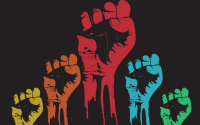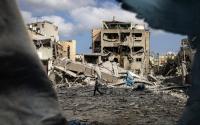Palestinian-born intellectual Edward Said died yesterday in New York after a long struggle with leukemia. He was 67. Said was the most eloquent and best-known spokesman of the Palestinian problem, at least in the West. However, his influence far exceeded the Palestinian and Arab question and marked new directions in the study of the Orient, Islam and perhaps the developing world at large. Said was born in Jerusalem in 1935 to a Christian Arab family. His father emigrated to the United States at the turn of the century and returned to Jerusalem in the 1920s, where he had a profitable business in writing instruments. The family built a house in Jerusalem's Talbieh neighborhood - where Brenner street is today. The house became a source of contention after the family lost it following the 1948 war. Said was raised in Jerusalem and Cairo, where his father had extensive business. In 1951, he went to the United States to attend Princeton and Harvard universities. He specialized in English literature, comparative literature and musicology. He was appointed professor at Columbia University in New York City, where he stayed for the rest of his life. The turning point in his career occurred in 1967, following the Six-Day War, at which point he became identified with the Palestinian cause and the leadership of the PLO. He wrote a great deal on the subject, but what made him world-famous was his book "Orientalism," whose impact on academia was enormous. The book placed Said at the center of an international intellectual debate. Published in 1978, "Orientalism" was a brilliantly written critique of the West, its academia, colonial officials, authors and artists, whose study and research of the Oriental experience, Said said, did not only serve to enrich knowledge but also assist in the occupation, the control and the subjugation of the Orient. Thus, according to Said, the Arab existence was presented to the West as static, passive and backward, facing a superior West. Said was sharply against the Oslo accords, and in his provocative style called the Palestinian Authority established by Yasser Arafat a combination of corruption and dictatorship. In recent years, a vast chasm developed between Said and the Palestinian leadership. During certain periods, senior members of the Palestinian Authority asked to have his writings banned. For more than a decade, Said battled leukemia, but never stopped writing, choosing to participate in conferences and speak out with the vehemence that characterized him. In recent years, he visited Jerusalem on a number of occasions and asked to see the house his family lost in 1948. He made many Israeli acquaintances and had many Jewish friends in the United States. However, among the American Jewish establishment, he was considered public enemy number one.
Kâinatın tüm seslerine, renklerine, titreşimlerine Açık Radyo...
Ekolojiden siyasete, edebiyattan müziğe Apaçık Radyo'da haftanın öne çıkan gündemleri mail kutunuzda!
İletişim
Açık Medya Yayıncılık A.Ş.
Koltukçular Çıkmazı No 7 İç Kapı No 2
Tophane, Beyoğlu, İstanbul, TR-34425
Telefon: +90 212 343 4040
Faks: +90 212 232 3219
E-posta: [email protected]






